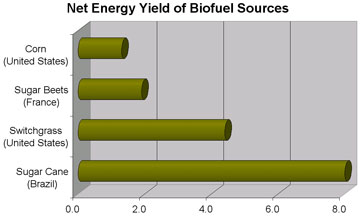Biofuels demand will increase, not decrease, world food supplies argues scientist
Biofuels demand will increase, not decrease, world food supplies
mongabay.com
March 27, 2007
As concerns mount over fuel-versus-food competition for crops, a Michigan State University ethanol expert says that cellulosic ethanol could render the debate moot.
Bruce Dale, an MSU chemical engineering and materials science professor, notes that ethanol can be made from cellulosic materials, like farm waste, instead of corn grain.
“We grow animal feed, not human food in the United States,” Dale said. “We could feed the country’s population with 25 million acres of cropland, and we currently have 500 million acres. Most of our agricultural land is being used to grow animal feed. It’s a lot simpler to integrate animal feed production into cellulosic ethanol production than it is to integrate human food production. With cellulosic ethanol, the ‘food vs. fuel’ debate goes away.”
Dale believes that demand for cellulosic ethanol, which is made from the stems, leaves, stalks and trunks of plants, will result in greater production of grasses and woody materials grown specifically for their energy content. He says that these “energy crops” can be grown on marginal lands not currently used for food of animal feed production.
 Chart showing Net Energy Yield from various fuel crops. |
“This will reduce pressure on our land resources,” said Dale. “We’ll be able to get more raw material out of one acre of land.”
“The evidence indicates that large-scale biofuel production will increase, not decrease, world food supplies by making animal feed production much more efficient,” Dale argued.
Many environmentalists have expressed concerns that biofuels will increase food prices and spur forest-clearing in tropical countries. Some have further suggested that cellulosic ethanol production could fuel large-scale deforestation if populations begin to converting trees to high-energy liquid fuel.
Related
High oil prices fuel bioenergy push. High oil prices and growing concerns over climate change are driving investment and innovation in the biofuels sector as countries and industry increasingly look towards renewable bioenergy to replace fossil fuels. Bill Gates, the world’s richest man, has recently invested $84 million in an American ethanol company, while global energy gluttons ranging from the United States to China are setting long-term targets for the switch to such fuels potentially offering a secure domestic source of renewable energy and fewer environmental headaches.
Government pledges $385M for cellulosic ethanol — 3/8/2007
The U.S. Department of Energy (DOE) announced it will invest up to $385 million over the next four years for six biorefinery projects capable of producing more than 130 million gallons of cellulosic ethanol annually.
Proposed U.S.-Brazil ethanol alliance threatens Amazon rainforest — 3/6/2007
A proposed ethanol alliance that President Luiz Inacio Lula da Silva is expected to forge with U.S. President George W. Bush later this week poses both opportunities and risks for the environment, a top U.N. environmental official said Monday.
Termites can make ethanol — 3/6/2007
Achim Steiner, Executive Director of the UN Environment Programme (UNEP), says that termites can be used to make eco-friendly ethanol. He cites U.S. government backed research showing that “microbes living in the guts of termites have potent enzymes able to efficiently and cost effectively transform woody wastes into sugars for ethanol production.”
Weedy grass could free U.S. of foreign oil dependence says biologist — 2/16/2007
A weedy grass may hold the key to domestic energy security and mitigating emissions of greenhouse gasese, said a Stanford University plant biologist speaking Friday at the annual meeting of the American Association for the Advancement of Science in San Francisco.
Ethanol always not as green as some believe — 2/16/2007
Ethanol is generally not as green as some people believe says to Bruce Dale, Michigan State University professor of chemical engineering and materials science. Speaking at the American Association for the Advancement of Science annual meeting in San Francisco, Dale says that while corn ethanol produces less greenhouse gases than gasoline, it can cause other detrimental environmental effects if not carefully managed.
This article used quotes and information from a Michigan State University news release